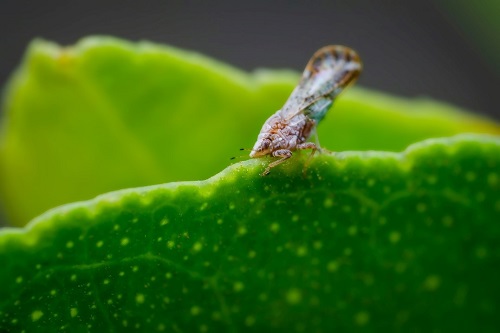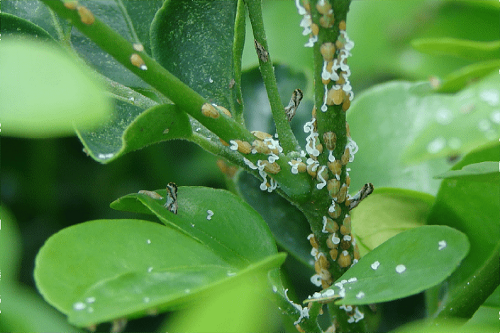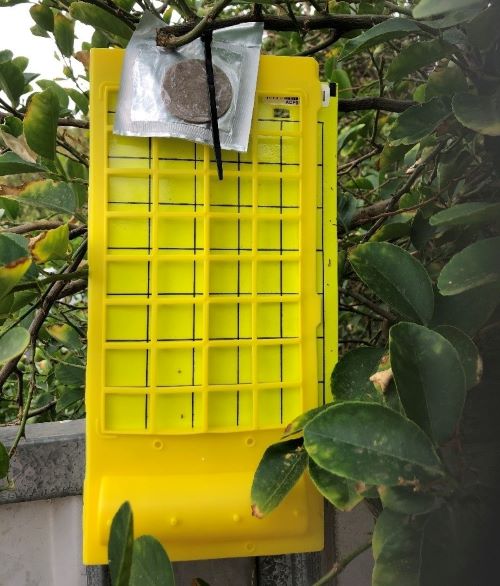CitrusWatch program
CitrusWatch is a national 5-year program that aims to protect the Australian citrus industry from harmful exotic pests.
One of these pests is the Asian citrus psyllid (ACP), which can cause huánglóngbìng (HLB) disease, also known as citrus greening.


ACP (diaphorina citri) and the nymphs that exude a distinctive white, waxy material.
They can bypass border biosecurity inspections through imported freight, food and plant material. If they do, residential yards with a citrus or Murraya tree (curry leaf or orange jasmine) could be next.
To detect these pests as early as possible, the Department of Agriculture and Fisheries is searching for volunteers to set up sticky traps in their garden.
How you can help
Sticky traps are a simple and effective tool for early detection of pests. They come with a scent that is attractive to ACP.
By placing a sticky trap in your tree, you will:
- contribute valuable data to this program
- improve the industry’s ability to detect and respond to harmful pests.

Sticky traps will be used as a surveillance tool for the detection of pests (photo credit: Citrus Australia).
For a printable version of program information and who can get involved, get the fact sheet PDF (287.7 KB).
Who can help
Anyone with a citrus or Murraya tree (curry leaf or orange jasmine) can take part.
Community groups, schools, backyard gardeners and commercial growers are encouraged to get involved.
It can be a fun and interesting learning activity for the whole family.
How it works
Sticky trapping will take place twice a year from 2022 to 2026.
You will be provided with everything you need including:
- sticky traps
- instructions
- submission forms
- pre-paid envelopes.
For best results, follow these steps:
Step 1. Change the sticky trap every 2 weeks.
Step 2. Fill in a submission form.
Step 3. Put the form and the used traps in the envelope provided and place it in your nearest post box.
The department’s team of entomologists (insect scientists) at Berrimah Farm Science Precinct will then inspect them and we will let you know of their findings.
How to register
You can register by filling in the online form.
Extra resources for commercial citrus growers
If you’re a commercial citrus grower, you can register for visual inspections. They will take place twice a year over the next 5 years.
Plant biosecurity officers will inspect your citrus trees and may also take plant or insect samples.
The department’s plant pathologists and entomologists will inspect these samples and let you know of their findings.
The main target pests are:
- HLB (citrus greening) and its insect vectors Asian and African citrus psyllid
- citrus canker
- Xylella and its insect vector glassy-winged sharpshooter - read more on the PHA website.
Sticky traps will also be made available to all NT citrus growers throughout this 5-year program.
For a printable version of this information, get the information for citrus growers fact sheet PDF (486.0 KB).
For a list of resources in English, Chinese, Indonesian, Khmer, Thai and Vietnamese visit the Citrus Australia website.
More information about the industry and program
The Australian citrus industry has production regions located in most states and territories, with an annual national crop worth over $900 million.
Produce grown in the Northern Territory is pomelo, lemons, limes, grapefruit and makrut lime leaf.
To protect this industry, the CitrusWatch program works with government agencies, research programs, community groups, and citrus businesses.
Go to the Citrus Australia website:
- to read more about the program
- for biosecurity training and resources.
Read the CitrusWatch annual activity report 2022-23 PDF (3.1 MB).
Contact
To find out more, email plantbiosecurity@nt.gov.au.
Give feedback about this page.
Share this page:
URL copied!